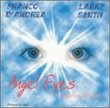| All Artists: Neil Howlett, Sherrill Milnes, Richard [1] Strauss, Erich Leinsdorf, Julia Hamari, Regina Resnik, London Symphony Orchestra, Elizabeth Bainbridge, Montserrat Caballé, David Lennox, Gwyn Griffiths, James King, John Brecknock, Kenneth MacDonald, Richard Lewis, Robert Bowman Title: Strauss: Salome Members Wishing: 0 Total Copies: 0 Label: RCA Victor Europe Release Date: 10/17/1989 Album Type: Import Genre: Classical Style: Opera & Classical Vocal Number of Discs: 2 SwapaCD Credits: 2 UPC: 035628664426 |
Search - Neil Howlett, Sherrill Milnes, Richard [1] Strauss :: Strauss: Salome
 | Neil Howlett, Sherrill Milnes, Richard [1] Strauss Strauss: Salome Genre: Classical
|
CD DetailsSimilar CDs
|
CD ReviewsCaballe sings Strauss Eeesh | US | 05/21/2005 (5 out of 5 stars) "Who would have expected Montserrat Caballe, well known for her rendition of the notoriously difficult but stylistically worlds-away-from-Strauss part of Norma, to render up one of the truly great recordings of Salome? After listening to the other major recordings I just keep coming back to Caballe. There is something seductive and overwhelming about her interpretation, which comes through as powerful, stunningly beautiful, yet somehow childlike. Don't get me wrong, Caballe's singing is both rich and nuanced, but for some reason it seems more believable to me for the role than any other I have heard. I suspect this is just what Strauss wanted, for he said the part should be sung by a "16 year old with the voice of Isolde." Too bad this recording is out of print, because it's really first rate from top to bottom, but it's Caballe's singing which is the real draw, proving once again what a versatile singer she is. Brava Caballe!" Still Available G. Dowling | St. Louis, MO, USA | 09/22/2006 (5 out of 5 stars) "In response to other review, this is NOT out of the catalogue. Check Borders' and you'll find it easily enough. And yes, it's worth the little trouble this takes to buy this great recording. Caballe is nothing short of sensational and Leinsdorf runs a crisp ship. It's now my Salome of choice." Superb - and often overlooked Ralph Moore | Bishop's Stortford, UK | 06/01/2009 (5 out of 5 stars) "This is clearly one of Leinsdorf's best recordings, worthy to rank alongside his "Die Walküre" (see my review); my only slight difference with the Santa Fe listener is to observe that I do not think Leinsdorf is so much too relaxed as unvaried; he keeps the "pedal to the metal" throughout and thus creates a febrile atmosphere which leaves little room for the kind of subtleties that Karajan finds in his account. The LSO responds to his insistence on momentum and plays superbly; the result is a big, crude, exciting, indulgent, Expressionist splurge of sound. Fortunately, this generalised, gung-ho onslaught on the score is counter-balanced by the nuance and delicacy of the young Caballe's interpretation of Salome. I worried that she might not find the right voice as she can sometimes sound matronly - but not here; she floats her trademark pianissimi to suggest the chilling faux-naiveté of the twisted teenager - and of course, given her early experience performing in Germany, her German is very convincing. Milnes gives us a Jokanaan of the kind I like and which compares with Van Dam in the Karajan: a noble, soaring-voiced prophet whose diatonic music and stern warnings sound like the voice of divine judgement when set against the crazed decadence of Herod's court. Unfortunately, the dramatically convincing and justified sound-effect of placing Milnes' voice deep in the cistern-prison means that we cannot hear him as well as I would have liked. Richard Lewis' Herod is a tour de force, very well sung and bringing out all the craven nastiness of the most unhinged monarch in opera. James King gives us a suitably neurotic and angst-ridden Narraboth and although Regina Resnik's Herodias is a bit worn, this is not unsuitable for that raddled old whore and she characterises skilfully. (I always enjoy Herodias' cackling mockery of Herod when he attempts to bribe Salome by offering her his collection of milk-white peacocks: "Und du, du bist lächerlich mit deinem Pfauen.") and the rest of the cast consists of some of the best British singers around in the late 60's; particular mention must go to Michael Rippon's rich-toned First Nazarene.
This set has been neglected in favour of the Solti and Karajan versions; I like very much all three as they all offer a valid and absorbing take on this wonderfully concise concentrated opera. (One wonders whether Strauss could not have been so rigorous and economical in other of his works, which have more than their fair share of "mauvais quart d'heures".)" |

 Track Listings (22) - Disc #1
Track Listings (22) - Disc #1
